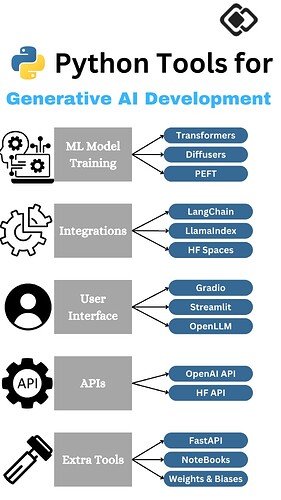Creating generative AI applications requires a blend of powerful machine learning models, tools for deployment, and user-friendly interfaces. Here’s an overview of some essential Python tools to consider:
ML Model Training:
- Transformers: A comprehensive library by Hugging Face designed for natural language processing tasks. It offers thousands of pre-trained models for tasks like text generation, translation, and summarization.
- Diffusers: Another Hugging Face library, Diffusers simplifies the process of training and deploying diffusion models, which are key for image and other generation tasks.
- PEFT: Parameter-Efficient Fine-Tuning (PEFT) techniques allow you to fine-tune large models for specific tasks or improve performance with less data, making it more practical to adapt AI for specialized needs.
Integrations:
- Langchain: This toolkit makes it easier to integrate large language models into real-world applications, focusing on ease of use and utility.
- LlamaIndex: Helps AI models improve information retrieval and indexing, enhancing knowledge management in your AI-driven applications.
- HF Spaces: Hugging Face Spaces provide a platform to host, demo, and share machine learning models with the community, offering a direct connection to Hugging Face’s ecosystem.
User Interface:
- Gradio: An intuitive library for quickly creating web-based user interfaces (UIs) for machine learning models, allowing you to easily share and demo your work.
- Streamlit: A powerful open-source app framework tailored for ML and Data Science projects, enabling you to rapidly build and deploy interactive apps.
- OpenLLM: Another great platform to host, demo, and share models, integrated with Hugging Face for seamless deployment and collaboration.
Extra Tools:
- FastAPI: A modern framework for building high-performance APIs with Python, often used to serve machine learning models in production environments.
- Notebooks: Jupyter Notebooks provide an open-source environment to create and share code, particularly useful for experimentation in generative AI projects.
- Weights & Biases: A tool for tracking machine learning experiments, offering version control and collaborative reports that make managing model development more efficient.
APIs:
- OpenAI API: Access to advanced generative models like GPT-3, GPT-4, Codex (for code generation), and DALL-E (for image creation), allowing developers to integrate powerful AI capabilities into their applications.
- HF API: Hugging Face’s API provides access to a wide range of pre-trained models across various domains, including natural language processing, computer vision, and audio processing.
By combining these tools, you can streamline everything from training models to integrating them into applications, and creating engaging user interfaces.
